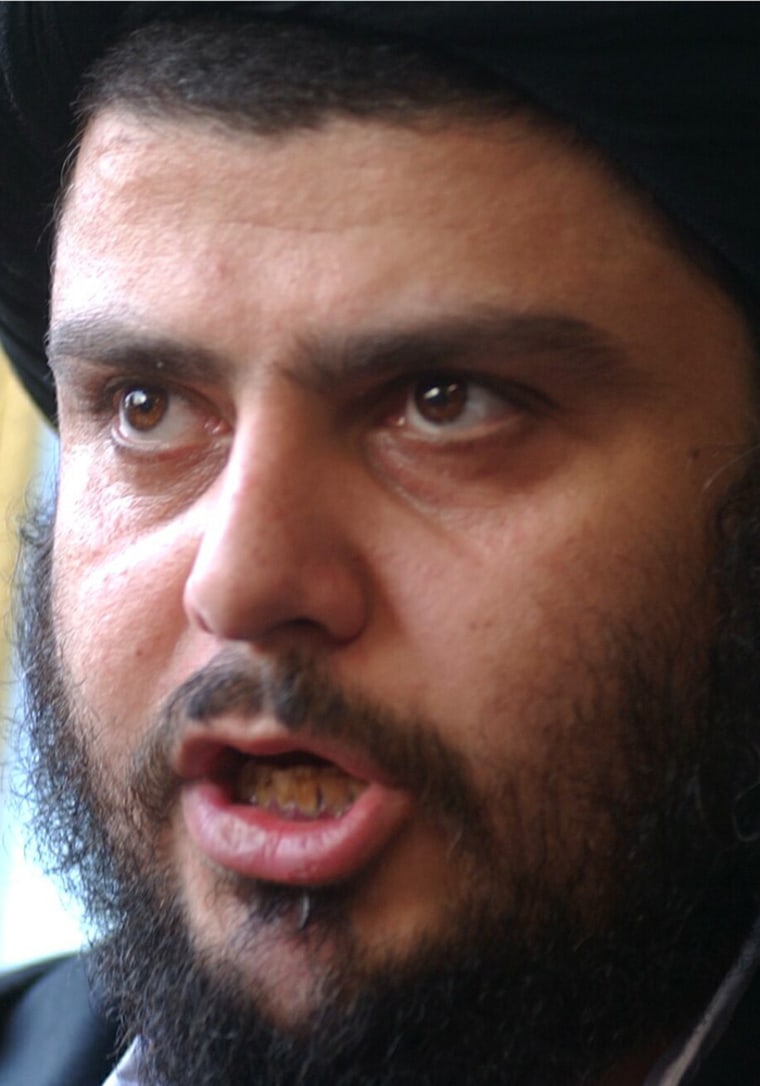Anti-U.S. cleric Muqtada al-Sadr has returned to Iraq after nearly three years in Iran, Iraqi officials said Wednesday.
Mohammed al-Kaabi, a Sadrist official in Baghdad, said al-Sadr, whose forces have presented some of the main opposition to the U.S. since the 2003 invasion, was in the city of Najaf at his family home.
His mere presence in the country he has not publicly visited for years was cause for jubilation among his supporters Najaf and around the country.
Al-Sadr visited the holy shrine of Imam Ali, revered among the country's Shiite majority, wearing a black turban distinguishing him as one of the descendants of the Prophet Mohammed, the founder of Islam, and surrounded by a phalanx of bodyguards who attempted to hold back a throng of supporters.
He also visited the grave of his father, who was assassinated during Saddam Hussein's regime, before heading to his house.
Sadrist supporters from Baghdad including top-ranking officials in his political faction streamed to Najaf for the occasion and his followers chanted "Imam Ali is with you" through the streets of the southern city.
"He is our hero. We sacrificed for him. He said 'No' to the Americans and fought the Americans, and he is brave," said Mohammed Ali, one of al-Sadr's followers.
It was not immediately clear how long al-Sadr would stay in Iraq or whether the return marked a permanent decision to remain in the country, where his presence would mark a seismic shift in Iraqi politics.
But at least one official from the Sadrist office in Najaf said he would remain in Iraq. The official did not want to be named because he was not authorized to speak to the media.
An official with Prime Minister Nour al-Maliki's office confirmed a plane carrying al-Sadr flew into the southern city earlier Wednesday afternoon. He did not want to be identified because of the sensitivity of the situation.
Sadrist officials said he had returned after his movement struck a deal to be part of a new government.
Al-Sadr, the scion of a Shiite religious family, galvanized anti-U.S. sentiment following the overthrow of Saddam Hussein and led two uprisings against U.S. forces in 2004.
He fled Iraq sometime between 2006-2007 after an arrest warrant was issued for him.
The cleric's Mehdi Army, once a feared militia, has largely laid down its arms but U.S. military officials and many Sunni Arabs still regard it with suspicion.
Sectarian killingsThe Mehdi Army was blamed for many of the sectarian killings that ravaged Iraq after the invasion.
Al-Sadr's political movement secured a deal to be part of Iraq's new government after supporting incumbent Prime Minister Nuri al-Maliki for a second term in office.
It has 39 seats in the new parliament and will get seven ministries.
News of Al-Sadr's return comes as Iran is pushing to cement ties with Iraq. Tehran's influence is on the rise, with American troops preparing to go home.
Officials from around the Middle East have been streaming into Iraq since the new Shiite-led government was sworn in last month, nine months after an inconclusive election that led to prolonged political wrangling.
Iranian Foreign Minister Ali Akbar Salehi visited the country a few days after Jordan and Egypt sent senior delegations.
Iraq's mainly Sunni neighbors are racing to try to regain their influence in Iraq, partly to counter Shiite Iran's rising power.
Iraq and Iran were long bitter rivals, especially under Saddam Hussein's Sunni-dominated regime, and fought a brutal eight year war in the 1980s, which killed hundreds of thousands on both sides.
Relations improved dramatically with the overthrow of Saddam's regime and the installation of a Shiite-dominated government.
Iran is one of Iraq's largest trading partners, and millions of Iranian Shiite pilgrims travel to Iraq yearly.
At a joint press conference with his Iraqi counterpart, Salehi said his country was looking forward to boosting relations in all fields with the new Iraqi government.
Iranian opposition group
Iraqi Foreign Minister Hoshyar Zebari said the two sides discussed "in detail" an Iranian opposition group that Iran wants expelled from Iraq. His comments suggested Iraq may finally be ready to tackle an issue that has long angered Iran.
"Our constitution doesn't allow any armed group on our land that launches attacks and assaults against neighboring countries," Zebari said.
"We are determined to deal with this issue and there were some good suggestions to put an end to it," he added, without elaborating.
The group — known as the Mujahedeen-e-Khalq — fought alongside Saddam during his 1980s war with Iran and once launched hit-and-run attacks inside Iran.
Many of the group's supporters live in a camp north of Baghdad that used to be protected by American troops but is now encircled by Iraqi forces.
